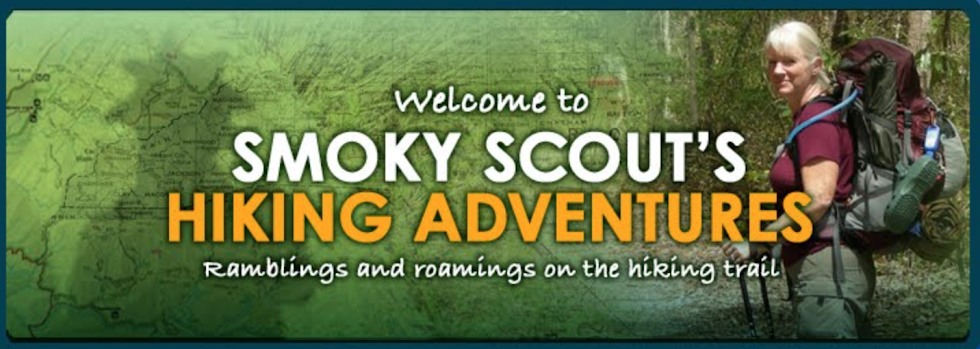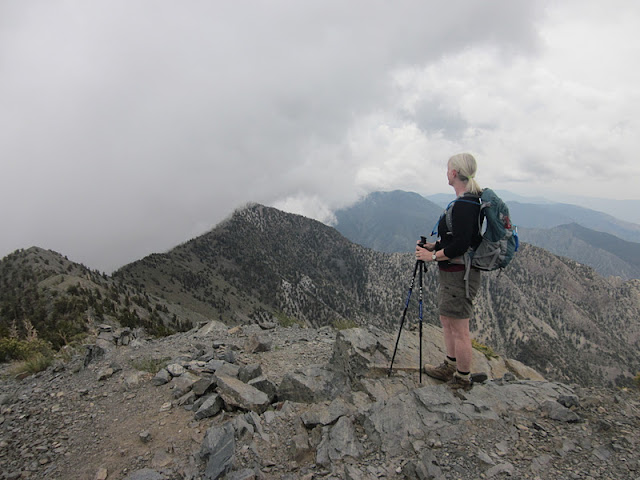Death Valley Day 4 – Telescope Peak – 12.3 Miles
And now for something completely different…
We’ve hiked through salt, sand, rocks and the Garden of Eden, all in the constant oppressive heat. Today’s hike seemed a little like home.
Telescope Peak is the highest point in Death Valley National Park, rising up from the desert floor to top out at 11,050 feet. Lots of reasons to be excited about this adventure: time to stretch our legs on one long hike, test the effects of altitude, the trailhead only one mile from our campground, and best of all, cool temps!
Another fun fact: Mahogany Flats, where the trail for Telescope Peak trail begins, is the highest campground in Death Valley, one mile further up the gravel road past our Thorndike home, at an altitude of 8,200 feet. (For you statistics people, our 6.2-mile trek to the summit gained 2,850 feet.)
As we were preparing to leave camp, a small army of utility trucks rumbled past on their way up to a communications facility on Rogers Peak. Suddenly our remote hike didn’t seem so remote.
I
shivered in the deliciously cool morning chill as we stepped onto the
trail. No worries about losing our way or each other on the wide open
mountainside. Early autumn flowers drew us along and each photo op was
better than the one before.
Indian paintbrush
There she looms – our first look at Telescope Peak
Tree hugging the mountainside
At Arcane Meadows the trail switched from one side of the mountain to the other. Something about a rock cairn makes people want to leave their own as a statement.
Twisted sisters
The trail turned slightly westward and skirted around Bennett Peak (which Jeff climbed on the return trek). Looking down into Panamint Valley – this photo doesn’t show them, but we could see Panamint Dunes where we had struggled through the sand just yesterday afternoon
The trail continued to a saddle south of Bennett Peak - Telescope Peak looking very steep and imposing
 |
At the saddle, looking down into the salt flats Badwater Basin – hey, we were there two days ago (Jeff's photo).
Close up of bristlecones
Magnificent bristlecone pine tree (Jeff's photo)
The
last mile was a steep climb eased by great switchbacks. My steps
became slower and slower and I had to stop several times – lack of
oxygen or just out of shape? I was the last one up the final steep
push.
Success! The summit was surprisingly small, bare rock with a pile of rocks on top of it and a box containing a trail log, a first aid kit, some Boy Scout troop patches and a near-empty bottle of Jack Daniel’s. I love hikers, don’t you?
Don’t look now, but there are some ominous clouds boiling up back there
Dolores signing the trail log
Clouds getting worse
After
just a few minutes of smiles and photos, Jeff suddenly announced he was
getting out of there, so we quickly headed for lower ground. At the
bottom of the steep mile we stopped to eat quickly in the shelter of
scrubby trees. No lingering, though, as the clouds grew more and more
threatening. The return hike was at a very fast pace.
Trail across rock scree – reminded me of Croagh Patrick in Ireland
Carolyn on the trail
With less than a mile to go, light rain began to fall and I stopped to put on rain gear. We were all spread out in our individual zones, making our way down. Then I heard thunder rumbling behind me and I began to jog, remembering how quickly we were overcome by our midnight storm on Sunday night. Even worse than huddling in a tent, I was exposed on the side of a mountain with metal hiking poles in my hand.
Of course, we all arrived at the car unscathed and congratulated ourselves on summiting Telescope Peak. This was perhaps my favorite Death Valley hike because of the cool temperature and bird’s eye views into the valleys.
An added bonus of finishing a hike in daylight - we were finally able to check out an incredible feature near our campsite that we had been driving past for five days, these Wildrose charcoal kilns used to burn wood down into charcoal, which was then used as fuel for smelters at the lead and silver mines in Death Valley. The kilns have not been used since 1879. They look like they will stand here forever.
An added bonus of finishing a hike in daylight - we were finally able to check out an incredible feature near our campsite that we had been driving past for five days, these Wildrose charcoal kilns used to burn wood down into charcoal, which was then used as fuel for smelters at the lead and silver mines in Death Valley. The kilns have not been used since 1879. They look like they will stand here forever.
We decided to skip our next hike at Mosaic Canyon because of the late hour, said goodbye to Death Valley, and drove to the little town of Lone Pine, the jumping-off point for our next challenge – a three-day, two-night backpack trip to summit Mount Whitney, the highest point in the lower 48 states.
And even more important, our first shower in five days.

























No comments:
Post a Comment